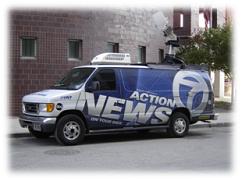Our friend Mike Anthony made some nice contributions to our blog in 2011. One of his ongoing themes revolved around partnerships – the need for radio companies to explore smart alliances that can enhance content and/or distribution – all under the umbrella of financial responsibility and just plain common sense.
Late last year, the New York Times carried a story about how NBC-TV affiliates are redefining their local news products.
 Early in my career when I worked for then ABC-owned WRIF, we were headquartered on the same complex with WXYZ-AM and Channel 7 here in Detroit. In those days, Channel 7 Action News was the hot TV news show in town featuring the coolest anchors, and the best known weather and sports personalities. It seemed like they were always #1 and had a garage full of minicam trucks and other toys that were symbolic of the rampant profitability of local television news. Truckloads of money were being generated by Channel 7 quarter after quarter.
Early in my career when I worked for then ABC-owned WRIF, we were headquartered on the same complex with WXYZ-AM and Channel 7 here in Detroit. In those days, Channel 7 Action News was the hot TV news show in town featuring the coolest anchors, and the best known weather and sports personalities. It seemed like they were always #1 and had a garage full of minicam trucks and other toys that were symbolic of the rampant profitability of local television news. Truckloads of money were being generated by Channel 7 quarter after quarter.
Those days are gone, and NBC’s move to connect its TV affiliates with news gathering entities in local markets is a sign of the times. And it should also be a signal for radio companies to explore partnerships – as companies and as local entities.
But there’s a twist. These NBC affiliates are forming alliances with nonprofit news organizations. Talk about odd bedfellows.
 In Chicago, NBC’s TV station is connected with The Chicago Reporter blog and magazine. In Philly, it’s public radio station WHYY (and its website NewsWorks). And in L.A., NBC’s affiliate has hooked up with KPCC, another public radio station.
In Chicago, NBC’s TV station is connected with The Chicago Reporter blog and magazine. In Philly, it’s public radio station WHYY (and its website NewsWorks). And in L.A., NBC’s affiliate has hooked up with KPCC, another public radio station.
Why? Part of the reason has to do with the Comcast/NBC Universal deal where the former had to commit to news coverage in order to win government approval. But the other side of this logic is articulated by Valari Staab, the head of NBC’s owned TV stations as they “looked for what organizations we thought could contribute unique content we couldn’t otherwise have.”
Isn’t that what partnerships are about? Each side bringing something proprietary and valuable to the table?
 For local radio, this could mean an alliance with the local free metro guide newspaper in town – a way to generate shared web content, the use of their reporters, and a morning show platform that reaches thousands of listeners. You could dream these up all day, but the fact is, if you’re not thinking partnerships, the chances of them simply materializing aren’t real good.
For local radio, this could mean an alliance with the local free metro guide newspaper in town – a way to generate shared web content, the use of their reporters, and a morning show platform that reaches thousands of listeners. You could dream these up all day, but the fact is, if you’re not thinking partnerships, the chances of them simply materializing aren’t real good.
Just as many municipalities are struggling to maintain essential services (fire and police departments, libraries) by combining resources, buildings, and personnel with nearby towns, cities, and villages, broadcast radio could help itself by changing its thinking about who can bring what to the table.
I have heard many commercial broadcasters disparage public media – its government support, its lack of ratings pressure, and any number of other complaints about free market competition, subsidies, and yes, politics.
But instead of viewing that public radio or TV station in your market as a pariah, a non-entity, or something that simply isn’t on your radar screen, think about how existing news organizations and community groups might enhance your product. Consider how that free newspaper’s resources might complement your on-air and online content, providing you with value that your diminishing staff no longer contributes.
For too many years, radio broadcasters have gone it alone. Thinking partnerships might be an important first step in continuing to provide vital, cume-worthy products that are unique, local, and vital in a Pandora world.
- AI Your Commercials - January 8, 2025
- For Radio, What Is The Future Of Nostalgia? - January 7, 2025
- The Commish - January 6, 2025




Leave a Reply